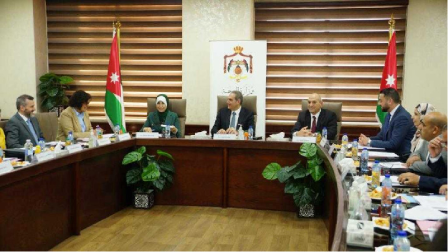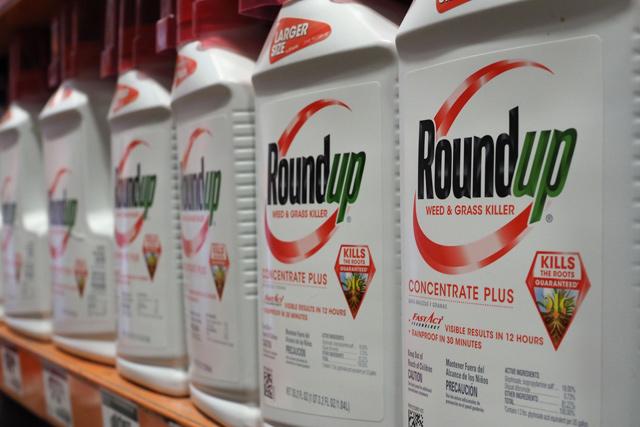You are here
Is world’s most widely used weed killer carcinogenic?
By Reuters - Apr 19,2016 - Last updated at Apr 19,2016
LONDON — The latest dispute to blow up around the International Agency for Research on Cancer (IARC) concerns glyphosate, an ingredient in one of the world’s most widely used weed killers, Roundup, made by Monsanto.
In March 2015, an IARC monograph concluded that glyphosate is “probably carcinogenic”. Yet, seven months later the European Food Safety Authority (EFSA), an independent agency funded by the EU, published a different assessment, saying glyphosate is “unlikely to pose a carcinogenic hazard to humans”.
The EFSA study drew on work by the German Federal Institute for Risk Assessment, which had concluded there was “no validated or significant relationship” between exposure to glyphosate and an increased risk of cancer.
Some campaign groups have suggested EFSA was unduly influenced by studies backed by Roundup’s manufacturer, Monsanto. An EFSA spokesman said its assessment considered hundreds of scientific studies, both independent and industry-sponsored.
“The status of a study — e.g. independent or industry-sponsored — is irrelevant to the assessment if the study is designed, carried out and reported well,” he said in an e-mailed response. He said EFSA had published detailed information about every study used in its glyphosate assessment, including regulatory studies submitted by companies.
The World Health Organisation — IARC’s parent organisation — and the United States Environmental Protection Agency (EPA), which first assessed glyphosate in 1986 and has reviewed it several times since then, had also previously concluded that glyphosate “has low toxicity for humans”.
The differences might seem modest, but they have potentially huge implications for farmers, the food industry and consumers because IARC’s ruling may affect whether the European Union continues to authorise glyphosate for use in Europe. EU officials are now faced with conflicting scientific advice. Without the herbicide, say some campaigners, food production may suffer.
A public war of words between EFSA and IARC has ensued. It began with a letter last November from 96 scientists who wrote to a senior EU official urging him to ignore what they said was a “flawed” EFSA assessment of glyphosate and to prefer IARC’s judgement instead.
The letter was led by the American scientist Chris Portier, who has long had links to the Environmental Defence Fund (EDF), a US non-governmental campaign group. The EDF opposes the use of pesticides and describes its mission as preserving “the natural systems on which all life depends”. On IARC’s website Portier was listed in 2013 as affiliated to the EDF as a “Senior Collaborating Scientist”.
In 2014, Portier chaired an IARC meeting at which the agency’s priorities for the coming year were outlined. They included an evaluation of glyphosate. The following year, Portier served as an “invited specialist” to the working group which decided that glyphosate was probably carcinogenic.
Critics say Portier’s EDF connections represent a conflict of interest and argue IARC should not have allowed him to be involved in the glyphosate evaluation. IARC said his involvement presented no problem, since he took part only as an invited specialist, who does not draft any text or participate in the evaluation.
Asked by Reuters whether he had a conflict of interest, Portier said: “I agree that this has the appearance of being a conflict of interest. However, in my opinion, for this to be a real conflict of interest, I would have to be working for the EDF on pesticide related issues and/or specifically on glyphosate related issues. I am not.” He said IARC’s decision to include him as an invited specialist was “proper and reasonable”.
EFSA defended its finding on glyphosate and hit back at IARC. In a speech to the European Parliament in December 2015, EFSA Executive Director Bernhard Url described IARC as engaging in “Facebook science”. He said the agency was taking an approach where “you have a scientific assessment, you put it on Facebook and you count how many people like it”.
Url said that was not how EFSA operated: “For us, this is no way forward. We produce a scientific opinion, we stand by it, but we cannot take into account whether it will be liked or not.”
Url also published an 18-page response to the letter from the 96 scientists, explaining how EFSA took a different approach to IARC. In it he invited IARC to a meeting to discuss their evidence and methodologies. IARC declined, demanding instead that EFSA issue a correction to its letter, which it alleged contained “factual errors”.
Kurt Straif, the head of IARC’s monographs assessing whether substances cause cancer, said his agency had turned down the invitation because EFSA had failed “to correct false statements”, and because “we don’t see a basis for a discussion within closed doors”.
An EFSA spokesman said it was “regrettable that the meeting is not going to take place”, and said EFSA “restates its commitment to co-operate with IARC and any other scientific organisation involved in the assessment of pesticides”.
Related Articles
AMMAN — Health Minister Firas Hawari on Monday received a delegation of international cancer prevention experts from World Health Organisati
NEW YORK — A US judge permanently barred California from placing a cancer warning on Bayer's Roundup, handing a victory to the German compan
FRANKFURT, Germany — German chemicals giant Bayer, long weighed down by woes related to its glyphosate-based weedkillers, reported an unexpe













